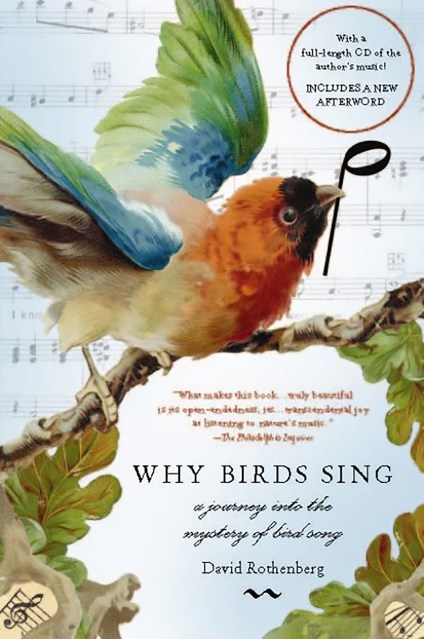
Birdsong is one of the great delights of any naturalist's life, and this book explores the fascinating question of why birds sing. The author is a philosopher and musician and, after playing his clarinet to a laughing thrush, became interested in the similarities between birdsong and human music.
Birdsong has always been important to people. The author shares stories of how Aboriginal Australians beleive that the lyrebird (which mimics the songs of other species) gave the other birds their voices, and the Hopi people of North America believe something similar about the mocking bird.
The book outlines the development of scientific studies of birdsong from recordings and annotation of songs in the field to the surely ethically dubious dissection of bird brains to find out how song works. The author discusses the ethics of these experiments and is clearly not entirely comfortable with them:
"... scientists ought to spend a little time...trying to justify the practice, rather than simply accepting its validity. Not even one songbird should be slaughtered without some pang of guilt"
He goes on to argue for the need for open discussion about the ethics of killing birds for science, but seems, finally, to accept that given the birds are well looked after before being 'sacrificed' (as the scientists like to say) that the experiments are worth it. I'm not sure, birdsong is a wonder in itself, I don't feel the need to kill the singer to find out where the song comes from.
The best part of the book are the anecdotes, such as the experience of Marianne Engel with her pet starlings:
"Another bird would imitate the soft sound of the fluorescent light above his cage, especially one time when the power was out, as if yearning for the light to come back. A third copied a teapot's whistle and when Engle got a new, non-whistling kettle, the bird would still whistle whenever the pot was placed on the stove"
Birdsong is becoming rarer as many species are declining, and the author ends a book with a plea to preserve nature so that future generations can continue to enjoy the beauty of birdsong.
The book is very technical in places, including lots of sonograms (graphs of sounds) and extracts of musical notation. This makes it slightly less accessible if you're not comfortable and familiar with these two methods of representing sound.
Why Birds Sing by David Rothenberg published by Basic Books (2005)
3 comments:
I think this is the one thing in which I lack knowledge..birdsong..even though I’m reasonably knowledgeable about birds. The book looks wonderful! 😁
I would be out of my league when it came to the sonograms and even have trouble identifying many birds by sound, even familiar ones. I wish I were better because lots of times you hear but don't see. Still I enjoy hearing the birdsong and can't imagine a world without it. I hadn't heard of a lyrebird before and immediately thought of our mockiing birds and then you immediately mentioned the similar beliefs of the first peoples on two continents. So interesting. (One place where we camped, every morning we watched a mocking bird who "sang" like a ringing phone -- this was a long time ago when everybody's phone sounded the same.
Hi Sal, it is a wonderful book, but is very technical in places. Birdsong is tricky to learn, particularly as most birds only sing for part of the year.
Hi Sallie, yes I find the sonograms very difficult. Birdsong is useful as you say when you don't see the bird. That's interesting about the mocking bird that sang like a mobile phone (I've heard of lyrebirds that sing like chainsaws, which is very sad).
Post a Comment